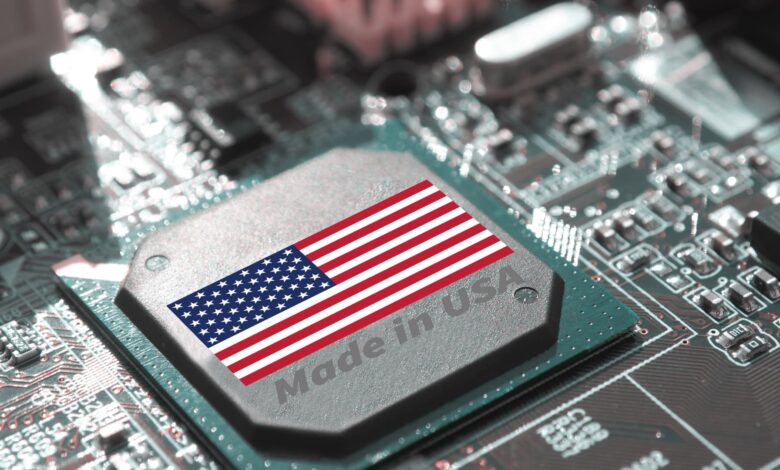Trump says tariffs will accelerate reshoring, but experts say it’s not that easy

President Donald Trump’s recent announcement of sweeping tariffs has sparked a conversation about the potential impact on manufacturing in the United States. While the president is optimistic that these tariffs will lead to a resurgence in domestic manufacturing, experts warn that the reality is much more complex.
Harry Moser, president of the Reshoring Initiative, acknowledges that the U.S. has lost millions of jobs to overseas operations due to cost considerations. He believes that tariffs could be part of the solution to this problem, but emphasizes the importance of addressing other factors such as the strength of the dollar and workforce development.
Moser does express some reservations about the level of the tariffs imposed by Trump, suggesting that lower levies may have been more effective in driving reshoring and foreign direct investment. However, he remains hopeful that the initial tariffs will lead to negotiations with other countries, ultimately benefiting American workers and consumers.
Despite the potential benefits of tariffs, there are still significant challenges to overcome in bringing manufacturing back to the U.S. Edward Mills, a Washington policy analyst, notes that the uncertainty surrounding the tariffs and their long-term implications may cause businesses to proceed cautiously. This uncertainty could hinder larger investments in industrial capacity, as companies wait to see how the situation unfolds.
Panos Kouvelis, a professor at Washington University, points out that Trump’s previous tariffs did not have a significant impact on reshoring or job creation. He emphasizes the need for clarity and stability in trade policy to encourage companies to invest in domestic production.
Christopher Tang, a professor at UCLA, highlights the complexity of redesigning supply chains in response to changing trade policies. He notes that companies are hesitant to make large investments without a clear understanding of future trade dynamics.
Manish Kabra, head of U.S. equity strategy at Societe Generale, underscores the importance of consumer confidence in driving business decisions. He warns that a crisis of confidence could slow down potential investments in the U.S. and delay the reshoring process.
Overall, experts agree that a comprehensive approach is needed to revitalize manufacturing in the U.S. This includes investing in infrastructure, workforce development, and regulatory reform. While tariffs may play a role in incentivizing companies to return to the U.S., rushing the reshoring process could be risky. It is essential to address the underlying challenges and create a supportive environment for domestic manufacturing to thrive. The shift from a focus on “College for all” to “A great career for all” is becoming increasingly important in today’s job market. Morgan Stanley’s Snyder believes that the United States is now in a prime position to attract companies looking to build their next projects. With $1.4 trillion in investments announced since the election, creating around 200,000 new jobs, the U.S. is seen as a favorable destination for manufacturing and reshoring operations.
One industry that is likely to see reshoring is the automobile sector, with companies like Hyundai investing billions of dollars in U.S. facilities. The imposition of tariffs on imported cars by the Trump administration has added urgency for manufacturers to consider relocating their operations back to the U.S. However, manufacturers of gas-powered cars may face challenges due to their streamlined supply chains.
On the other hand, electric vehicle manufacturers have fewer parts and are more likely to shift operations to the U.S. High-tech industries such as semiconductors and pharmaceuticals are also expected to reshore, especially with incentives like the CHIPS Act providing financial assistance and tax credits for building and expanding facilities domestically.
While semiconductors and pharmaceuticals were initially exempt from tariffs, experts anticipate that they may become targets in the future. Companies like Eli Lilly and Johnson & Johnson have already started expanding in the U.S. prior to the tariffs being imposed.
Overall, the shift towards prioritizing career opportunities over traditional college education is gaining momentum, with industries like manufacturing, technology, and pharmaceuticals leading the way in reshoring operations to the U.S. This trend is expected to create new job opportunities and drive economic growth in the country. The Impact of Social Media on Mental Health
In today’s digital age, social media has become an integral part of our daily lives. With platforms like Facebook, Instagram, Twitter, and TikTok dominating the online world, it’s no surprise that many people spend a significant amount of time scrolling through their feeds and engaging with content. While social media can be a great way to stay connected with friends and family, share updates, and discover new information, there is growing concern about its impact on mental health.
One of the biggest issues with social media is the pressure to present a perfect image online. Many users feel the need to constantly curate their feeds to showcase only the best moments of their lives, leading to feelings of inadequacy and low self-esteem when comparing themselves to others. This phenomenon, known as “social comparison,” can have detrimental effects on mental health, causing anxiety, depression, and even feelings of isolation.
Moreover, the constant exposure to unrealistic beauty standards and idealized lifestyles portrayed on social media can contribute to body image issues and eating disorders. Studies have shown that frequent use of social media is associated with higher rates of body dissatisfaction and disordered eating behaviors, particularly among young people who are more susceptible to these negative influences.
Another concerning aspect of social media is cyberbullying. With the anonymity that the internet provides, many individuals feel emboldened to harass, threaten, or spread rumors about others online. Cyberbullying can have serious consequences for mental health, leading to feelings of shame, embarrassment, and even thoughts of self-harm or suicide.
Additionally, the addictive nature of social media can also take a toll on mental well-being. The constant need for validation through likes, comments, and shares can lead to a cycle of seeking external approval for self-worth, which can be both exhausting and detrimental to one’s mental health.
Despite these negative impacts, it’s important to note that social media isn’t inherently evil. When used mindfully and in moderation, it can be a valuable tool for staying connected, sharing experiences, and finding support. However, it’s crucial for users to be aware of the potential risks and take steps to protect their mental health while using social media.
To mitigate the negative effects of social media on mental health, experts recommend setting boundaries around usage, unfollowing accounts that trigger negative feelings, and prioritizing real-life connections over online interactions. It’s also important to practice self-care, such as mindfulness, exercise, and seeking professional help if needed.
In conclusion, while social media can be a powerful tool for communication and connection, it’s essential to be mindful of its impact on mental health. By taking steps to protect oneself and prioritize well-being, we can navigate the online world in a healthier and more balanced way.





